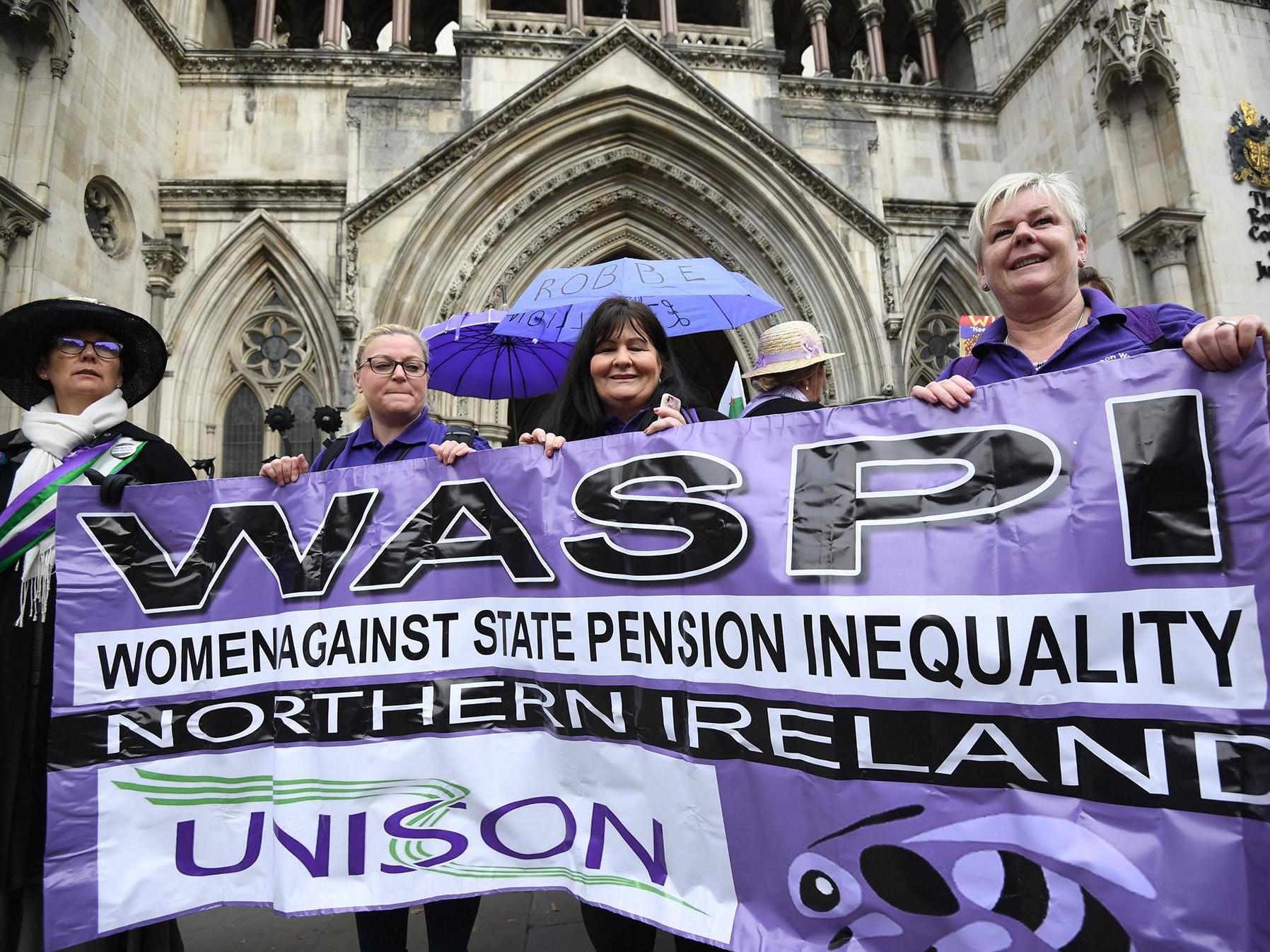Women lose landmark High Court fight against pension changes that caused homelessness and destitution
‘The worst affected have suicidal thoughts. They have sold properties and borrowed money. Some of them are homeless,’ says campaigner

Your support helps us to tell the story
From reproductive rights to climate change to Big Tech, The Independent is on the ground when the story is developing. Whether it's investigating the financials of Elon Musk's pro-Trump PAC or producing our latest documentary, 'The A Word', which shines a light on the American women fighting for reproductive rights, we know how important it is to parse out the facts from the messaging.
At such a critical moment in US history, we need reporters on the ground. Your donation allows us to keep sending journalists to speak to both sides of the story.
The Independent is trusted by Americans across the entire political spectrum. And unlike many other quality news outlets, we choose not to lock Americans out of our reporting and analysis with paywalls. We believe quality journalism should be available to everyone, paid for by those who can afford it.
Your support makes all the difference.Women affected by controversial adjustments made to the state pension age, which campaigners say unlawfully discriminates against women born in the 1950s, have lost their landmark High Court battle against the government.
Nearly four million women have been affected by the changes which increased the state pension age from 60 to 66.
Women hit by the overhaul have lost their homes and some have even been forced into homelessness.
The UN committee on the Elimination of Discrimination against Women has said the rise in the pension age has added to “poverty, homelessness and financial hardship among the affected women”.
Two claimants took the Department for Work and Pensions to court – arguing raising their pension age “unlawfully discriminated against them on the grounds of age, sex, and age and sex combined” and they were not given adequate notice to adjust.
Joanne Welch, founder of Backto60, which took the government to court over the issue, told The Independent: “The worst affected have suicidal thoughts. They have sold properties and borrowed money. Some of them are homeless. The list goes on.”
The state pension age has been increased by successive governments in a bid to ensure “pension age equalisation” – so that women’s state pension age matches that of men.
In a summary of the court’s decision, Lord Justice Irwin and Mrs Justice Whipple said: “The court was saddened by the stories contained in the claimants’ evidence.
“But the court’s role was limited. There was no basis for concluding that the policy choices reflected in the legislation were not open to government. In any event they were approved by parliament.
“The wider issues raised by the claimants about whether the choices were right or wrong or good or bad were not for the court. They were for members of the public and their elected representatives.”
Around 100 supporters attended the handing down of the judgment at the Royal Courts of Justice in London on Thursday.
There were some gasps at the back of the courtroom as Lord Justice Irwin announced the court’s decision.
Shadow home secretary Diane Abbott tweeted: “Disappointed to hear about today’s decision regarding the WASPI women. I will continue to support the WASPI-Campaign in their fight against pension inequality.”
Speaking outside the Royal Courts of Justice, Marcia Willis Stewart of Birnberg Peirce, which represented the claimants, said: “We are deeply disappointed by this decision.”
She added that the aim of the “arduous legal process” was “to rectify a substantial and far-reaching injustice”.
Up until 2010, women received their state pensions at the age of 60 but that has been increasing since then. The retirement age of both men and women will increase steadily to 67 by 2028.
Prime minister Boris Johnson’s official spokesperson said they welcomed the High Court’s judgement – adding it has “always been our view” the changes made were “entirely lawful and did not discriminate on any grounds”.
“Government decided in 1995 it was going to make the state pension age the same for men and women as a long-overdue move towards gender equality,” the spokesperson said. “Today the court recognised the extensive communications that the Department for Work and Pensions made to publicise these changes over many years. We are all living longer and we need to raise the age at which we draw the state pension to make it sustainable for now and for future generations.”
After the ruling, Ms Welch said: “Where do we go from here? Well, where will the government go from here is the better question.”
She referred to Mr Johnson’s pledge during the Tory leadership campaign to look at the state pension age issue with “fresh vigour”, adding: “We will be holding you to that undertaking.”
As Ms Welch finished a brief statement, supporters outside the Royal Courts of Justice chanted: “The fight goes on.”
Additional reporting by Press Association
Join our commenting forum
Join thought-provoking conversations, follow other Independent readers and see their replies
Comments